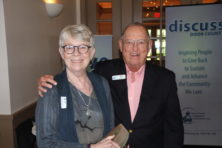Bret Bicoy: The Village is the Personal
- Share
- Tweet
- Pin
- Share
“It takes a village to raise a child.” That African proverb has been repeated so often that it’s taken as a matter of faith by leaders of all stripes and political persuasions. Yet the truth is that increasingly, too many of our children are not raised by a village. With the best of intentions, we’ve outsourced our responsibility as a village to countless human service and educational programs.
A few weeks ago I spoke at the annual breakfast for Big Brothers Big Sisters and shared my belief that we have attempted to professionalize the role of the village. We’ve tried to outsource too much of the raising of our children to activity leaders and program managers, teachers and school counselors, juvenile therapists and recreational staff, and countless other professional positions. Instead of a village, we’ve surrounded our young people with paid professionals.
John McKnight and Peter Block write in their book, The Abundant Community, “Professionalization is the market replacement for a community that has lost or outsourced its capacity to care.”
My lovely wife is a fourth grade teacher here in Door County. She is the very definition of a professional educator. She spends countless evenings and every Sunday afternoon preparing on her own time so she can spend her school day focused on her students. Thankfully, dedication like my wife’s is commonplace among many of the professionals who teach our children.
I work at the Door County Community Foundation. I’ve spent more than 20 years investing philanthropic dollars in the programs offered by human service and education professionals. I have seen firsthand how lives can be changed for the better by a well-run program that is faithful to a proven model.
I offer this background because I don’t want to diminish by one iota the importance of the work of human service and education professionals. The programs our society has created to serve and educate our children are critically important. These programs keep our kids safe today and nurture a brighter tomorrow.
Yet I am firm in my belief that McKnight and Block have identified perhaps the greatest source of our society’s current ills. There is something missing. No matter how effective our programs might be, there remains something hollow at their core.
As McKnight and Block write, systems are designed to create scale. They are built on the ability to reproduce the same result over and over again. Yet uniformity is both the strength and the bane of all systems. If consistency is the system’s strength, then the cost to our humanity is the system’s weakness. McKnight and Block warn us that systems, by their very nature, have a limit. Inherent in the professionalization of our programs is the need to maintain a professional distance between the service provider and the one who is being served. As the mantra goes, “You need to remain impartial. Don’t get too close to your clients. It might affect your judgment.”
This is the unavoidable reality of the program delivery systems we have created. It is not a failing of these systems, it’s just the reality of how they work.
It is not the programs or systems that are failing us. Our failure is that we as a society have forgotten that the professionals cannot do this alone. We have failed to remember that the village in that African proverb is not made up of professionals. You cannot hire people to be the village. We as a community of people have to be the village for each other.
When we weave people together in a neighborhood of personal relationships, we reap the benefits of the extended family. By being the village for each other not as professionals, but as human beings, we help our young people understand that it’s okay to take risks, to fall down, to be fallible, because they will always have a place at the table of our village family. We teach our children, and remind ourselves in the process, that we are all a worthy and integral part of the village whole.
The village is not the professional. It’s the personal.
This is why I agreed to speak at the breakfast for Big Brothers Big Sisters. They use institutional words like “mentoring” and phrases like “make a match,” but that’s just a bunch of professional mumbo jumbo that refers to personal relationships. Big Brothers Big Sisters works to create a personal space between people where affection, caring and friendship can blossom between a “big” and a “little.” It’s a space where every young person can come to know from experience that they are valued by our community. They learn that they are always welcome, and will forever have a place, in our village.
At that same Big Brothers Big Sisters breakfast, Jeremy Schwab shared his experience as a “big brother” for more than a dozen years now. He told a story of his “little brother” barging into his house in the wee hours of the morning to talk about the young man’s first kiss earlier that evening. Apparently it tasted like Doritos.
It would be completely inappropriate for a guidance counselor, juvenile therapist or other human service professional to invite a young man into their home at one o’clock in the morning. The ethical standards for human service professionals correctly require that they maintain a certain level of distance so that boundaries are not crossed and their judgment is not impaired. Inherent in what makes one a professional is an ability to maintain a professional detachment.
Yet someone needs to be attached to that young man. Someone needs to hear the story about his first kiss. He needs an extended family. He needs a village.
I like to think of it this way. What separates the professional and the personal is how we use our limbs. It’s the difference between the need to keep a client at arm’s length, and the hug and embrace of a friend.
Our human service and educational professionals have a critically important role in our community, but they cannot be the village. The village must be us as people.
Bret Bicoy is president and CEO of the Door County Community Foundation. Contact him at [email protected].


